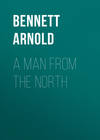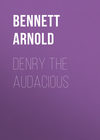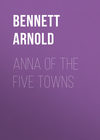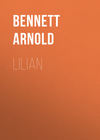Kitabı oku: «A Great Man: A Frolic», sayfa 12
CHAPTER XXV
THE RAKE'S PROGRESS
'Faites vos jeux, messieurs,' said the chief croupier of the table.
Henry's fingers touched a solitary five-franc piece in his pocket, large, massive, seductive.
Yes, he was at Monte Carlo. He could scarcely believe it, but it was so. Tom had brought him. The curious thing about Tom was that, though he lied frequently and casually, just as some men hitch their collars, his wildest statements had a way of being truthful. Thus, a work of his had in fact been purchased by the French Government and placed on exhibition in the Luxembourg. And thus he had in fact come to Monte Carlo to paint a portrait – the portrait of a Sicilian Countess, he said, and Henry believed, without actually having seen the alleged Countess – at a high price. There were more complexities in Tom's character than Henry could unravel. Henry had paid the entire bill at the Grand Hotel, had lent Tom a sovereign, another sovereign, and a five-pound note, and would certainly have been mulcted in Tom's fare on the expensive train de luxe had he not sagaciously demanded money from Tom before entering the ticket-office. Without being told, Henry knew that money lent to Tom was money dropped down a grating in the street. During the long journey southwards Tom had confessed, with a fine appreciation of the fun, that he lived in Paris until his creditors made Paris disagreeable, and then went elsewhere, Rome or London, until other creditors made Rome or London disagreeable, and then he returned to Paris.
Henry had received this remark in silence.
As the train neared Monte Carlo – the hour was roseate and matutinal – Henry had observed Tom staring at the scenery through the window, his coffee untasted, and tears in his rapt eyes. 'What's up?' Henry had innocently inquired. Tom turned on him fiercely. 'Silly ass!' Tom growled with scathing contempt. 'Can't you feel how beautiful it all is?'
And this remark, too, Henry had received in silence.
'Do you reckon yourself a great artist?' Tom had asked, and Henry had laughed. 'No, I'm not joking,' Tom had insisted. 'Do you honestly reckon yourself a great artist? I reckon myself one. There's candour for you. Now tell me, frankly.' There was a wonderful and rare charm in Tom's manner as he uttered these words. 'I don't know,' Henry had replied. 'Yes, you do,' Tom had insisted. 'Speak the truth. I won't let it go any further. Do you think yourself as big as George Eliot, for example?' Henry had hesitated, forced into sincerity by Tom's persuasive and serious tone. 'It's not a fair question,' Henry had said at length. Whereupon Tom, without the least warning, had burst into loud laughter: 'My bold buccaneer, you take the cake. You always did. You always will. There is something about you that is colossal, immense, and magnificent.'
And this third remark also Henry had received in silence.
It was their second day at Monte Carlo, and Tom, after getting Henry's card of admission for him, had left him in the gaming-rooms, and gone off to the alleged Countess. The hour was only half-past eleven, and none of the roulette tables was crowded; two of the trente-et-quarante tables had not even begun to operate. For some minutes Henry watched a roulette table, fascinated by the munificent style of the croupiers in throwing five-franc pieces, louis, and bank-notes about the green cloth, and the neat twist of the thumb and finger with which the chief croupier spun the ball. There were thirty or forty persons round the table, all solemn and intent, and most of them noting the sequence of winning numbers on little cards. 'What fools!' thought Henry. 'They know the Casino people make a profit of two thousand a day. They know the chances are mathematically against them. And yet they expect to win!'
It was just at this point in his meditations upon the spectacle of human foolishness that he felt the five-franc piece in his pocket. An idea crossed his mind that he would stake it, merely in order to be able to say that he had gambled at Monte Carlo. Absurd! How much more effective to assert that he had visited the tables and not gambled!.. And then he knew that something within him more powerful than his common-sense would force him to stake that five-franc piece. He glanced furtively at the crowd to see whether anyone was observing him. No. Well, it having been decided to bet, the next question was, how to bet? Now, Henry had read a magazine article concerning the tables at Monte Carlo, and, being of a mathematical turn, had clearly grasped the principles of the game. He said to himself, with his characteristic caution: 'I'll wait till red wins four times running, and then I'll stake on the black.'
('But surely,' remarked the logical superior person in him, 'you don't mean to argue that a spin of the ball is affected by the spins that have preceded it? You don't mean to argue that, because red wins four times, or forty times, running, black is any the more likely to win at the next spin?' 'You shut up!' retorted the human side of him crossly. 'I know all about that.')
At last, after a considerable period of waiting, red won four times in succession. Henry felt hot and excited. He pulled the great coin out of his pocket, and dropped it in again, and then the croupier spun the ball and exhorted the company several times to make their games, and precisely as the croupier was saying sternly, 'Rien ne va plus,' Henry took the coin again, and with a tremendous effort of will, leaning over an old man seated in front of him, pitched it into the meadow devoted to black stakes. He blushed; his hair tingled at the root; he was convinced that everybody round the table was looking at him with sardonic amusement.
'Quatre, noir, pair, et manque,' cried the croupier.
Black had won.
Henry's heart was beating like a hammer. Even now he was afraid lest one of the scoundrels who, according to the magazine article, infested the rooms, might lean over his shoulder and snatch his lawful gains. He kept an eye lifting. The croupier threw a five-franc piece to join his own, and Henry, with elaborate calmness, picked both pieces up. His temperature fell; he breathed more easily. 'It's nothing, after all,' he thought. 'Of course, on that system I'm bound to win.'
Soon afterwards the old man in front of him grunted and left, and Henry slipped into the vacant chair. In half an hour he had made twenty francs; his demeanour had hardened; he felt as though he had frequented Monte Carlo steadily for years; and what he did not know about the art and craft of roulette was apocryphal.
'Place this for me,' said a feminine voice.
He turned swiftly. It was Cosette's voice! There she stood, exquisitely and miraculously dressed, behind his chair, holding a note of the Bank of France in her gloved hand!
'When did you come?' he asked loudly, in his extreme astonishment.
'Pstt!' she smilingly admonished him for breaking the rule of the saloons. 'Place this for me.'
It was a note for a thousand francs.
'This?' he said.
'Yes.'
'But where?'
'Choose,' she whispered. 'You are lucky. You will bring happiness.'
He did not know what he was doing, so madly whirled his brain, and, as the black enclosure happened to be nearest to him, he dropped the note there. The croupier at the end of the table manœuvred it with his rake, and called out to the centre: 'Billet de mille francs.' Then, when it was too late, Henry recollected that black had already turned up three times together. But in a moment black had won.
'I can quite understand the fascination this game has for people,' Henry thought.
'Leave them there,' said Cosette, pointing to the two notes for a thousand francs each. 'I like to follow the run.'
Black won again.
'Leave them there,' said Cosette, pointing to the four notes for a thousand francs each. 'I did say you would bring happiness.' They smiled at each other happily.
Black won again.
Cosette repeated her orders. Such a method of playing was entirely contrary to Henry's expert opinion. Nevertheless, black, in defiance of rules, continued to win. When sixteen thousand francs of paper lay before Henry, the croupier addressed him sharply, and he gathered, with Cosette's assistance, that the maximum stake was twelve thousand francs.
'Put four thousand on the odd numbers,' said Cosette. 'Eh? You think?'
'No,' said Henry. 'Evens.'
And the number four turned up again.
At a stroke he had won sixteen thousand francs, six hundred and forty pounds, for Cosette, and the total gains were one thousand two hundred and forty pounds.
The spectators were at last interested in Henry's play. It was no longer an illusion on his part that people stared at him.
'Say a number,' whispered Cosette. 'Shut the eyes and say a number.'
'Twenty-four,' said Henry. She had told him it was her age.
'Bien! Voilà huit louis!' she exclaimed, opening her purse of netted gold; and he took the eight coins and put them on number twenty-four. Eight notes for a thousand francs each remained on the even numbers. The other notes were in Henry's hip-pocket, a crushed mass.
Twenty-four won. It was nothing but black that morning. 'Mais c'est épatant!' murmured several on lookers anxiously.
A croupier counted out innumerable notes, and sundry noble and glorious gold plaques of a hundred francs each. Henry could not check the totals, but he knew vaguely that another three hundred pounds or so had accrued to him, on behalf of Cosette.
'I fancy red now,' he said, sighing.
And feeling a terrible habitué, he said to the croupier in French: 'Maximum. Rouge.'
'Maximum. Rouge,' repeated the croupier.
Instantly the red enclosure was covered with the stakes of a quantity of persons who had determined to partake of Henry's luck.
And red won; it was the number fourteen.
Henry was so absorbed that he did not observe a colloquy between two of the croupiers at the middle of the table. The bank was broken, and every soul in every room knew it in the fraction of a second.
'Come,' said Cosette, as soon as Henry had received the winnings. 'Come,' she repeated, pulling his sleeve nervously.
'I've broken the bank at Monte Carlo!' he thought as they hurried out of the luxurious halls. 'I've broken the bank at Monte Carlo! I've broken the bank at Monte Carlo!'
If he had succeeded to the imperial throne of China, he would have felt much the same as he felt then.
Quite by chance he remembered the magazine article, and a statement therein that prudent people, when they had won a large sum, drove straight to Smith's Bank and banked it coram publico, so that scoundrels might be aware that assault with violence in the night hours would be futile.
'If we lunch?' Cosette suggested, while Henry was getting his hat.
'No, not yet,' he said importantly.
At Smith's Bank he found that he had sixty-three thousand francs of hers.
'You dear,' she murmured in ecstasy, and actually pressed a light kiss on his ear in the presence of the bank clerk! 'You let me keep the three thousand?' she pleaded, like a charming child.
So he let her keep the three thousand. The sixty thousand was banked in her name.
'You offer me a lunch?' she chirruped deliciously, in the street. 'I gave you a lunch. You give me one. It is why I am come to Monte Carlo, for that lunch.'
They lunched at the Hôtel de Paris.
He was intoxicated that afternoon, though not with the Heidsieck they had consumed. They sat out on the terrace. It was December, but like an English June. And the pride of life, and the beauty of the world and of women and of the costumes of women, informed and uplifted his soul. He thought neither of the past nor of the future, but simply and intensely of the present. He would not even ask himself why, really, Cosette had come to Monte Carlo. She said she had come with Loulou, because they both wanted to come; and Loulou was in bed with migraine; but as for Cosette, she never had the migraine, she was never ill. And then the sun touched the Italian hills, and the sea slept, and … and … what a planet, this earth! He could almost understand why Tom had wept between Cannes and Nice.
It was arranged that the four should dine together that evening, if Loulou had improved and Tom was discoverable. Henry promised to discover him. Cosette announced that she must visit Loulou, and they parted for a few brief hours.
'Mon petit!' she threw after him.
To see that girl tripping along the terrace in the sunset was a sight!
Henry went to the Hôtel des Anglais, but Tom had not been seen there. He strolled back to the Casino gardens. The gardeners were drawing suspended sheets over priceless blossoms. When that operation was finished, he yawned, and decided that he might as well go into the Casino for half an hour, just to watch the play.
The atmosphere of the gay but unventilated rooms was heavy and noxious.
He chose a different table to watch, a table far from the scene of his early triumph. In a few minutes he said that he might as well play, to pass the time. So he began to play, feeling like a giant among pigmies. He lost two hundred francs in five spins.
'Steady, my friend!' he enjoined himself.
Now, two hundred francs should be the merest trifle to a man who has won sixty-three thousand francs. Henry, however, had not won sixty-three thousand francs. On the other hand, it was precisely Henry who had paid sixty-five francs for lunch for two that day, and Henry who had lent Tom a hundred and seventy-five francs, and Henry who had paid Tom's hotel bill in Paris, and Henry who had left England with just fifty-five pounds – a sum which he had imagined to be royally ample for his needs on the Continent.
He considered the situation.
He had his return-ticket from Monte Carlo to Paris, and his return-ticket from Paris to London. He probably owed fifty francs at the hotel, and he possessed a note for a hundred francs, two notes for fifty francs, some French gold and silver, and some English silver.
Continuing to play upon his faultless system, he lost another fifty francs.
'I can ask her to lend me something. I won all that lot for her,' he said.
'You know perfectly well you can't ask her to lend you something,' said an abstract reasoning power within him. 'It's just because you won all that lot for her that you can't. You'd be afraid lest she should think you were sponging on her. Can you imagine yourself asking her?'
'Well, I can ask Tom,' he said.
'Tom!' exclaimed the abstract reasoning power.
'I can wire to Snyder,' he said.
'That would look a bit thick,' replied the abstract reasoning power, 'telegraphing for money – from Monte Carlo.'
Henry took the note for a hundred francs, and put it on red, and went icy cold in the feet and hands, and swore a horrid oath.
Black won.
He had sworn, and he was a man of his word. He walked straight out of the Casino; but uncertainly, feebly, as a man who has received a staggering blow between the eyes, as a man who has been pitched into a mountain-pool in January, as a somnambulist who has wakened to find himself on the edge of a precipice.
He paid his bill at the hotel, and asked the time of the next train to Paris. There was no next train to Paris that night, but there was a train to Marseilles. He took it. Had it been a train only to Nice, or to the Plutonian realms, he would have taken it. He said no good-byes. He left no messages, no explanations. He went. On the next afternoon but one he arrived at Victoria with fivepence in his pocket. Twopence he paid to deposit his luggage in the cloakroom, and threepence for the Underground fare to Charing Cross. From Charing Cross he walked up to Kenilworth Mansions and got a sovereign from Mark Snyder. Coutts's, where Mark financed himself, was closed, and a sovereign was all that Mark had.
Henry was thankful that the news had not yet reached London – at any rate, it had not reached Mark Snyder. It was certain to do so, however. Henry had read in that morning's Paris edition of the New York Herald: 'Mr. Henry S. Knight, the famous young English novelist, broke the bank at Monte Carlo the other day. He was understood to be playing in conjunction with Mademoiselle Cosette, the well-known Parisian divette, who is also on a visit to Monte Carlo. I am told that the pair have netted over a hundred and sixty thousand francs.'
He reflected upon Cosette, and he reflected upon Geraldine. It was like returning to two lumps of sugar in one's tea after having got accustomed to three.
He was very proud of himself for having so ruthlessly abandoned Monte Carlo, Cosette, Loulou, Tom, and the whole apparatus. And he had the right to be.
CHAPTER XXVI
THE NEW LIFE
They were nervous, both of them. Although they had been legally and publicly married and their situation was in every way regular, although the new flat in Ashley Gardens was spacious, spotless, and luxurious to an extraordinary degree, although they had a sum of nearly seven thousand pounds at the bank, although their consciences were clear and their persons ornamental, Henry and Geraldine were decidedly nervous as they sat in their drawing-room awaiting the arrival of Mrs. Knight and Aunt Annie, who had accepted an invitation to afternoon tea and dinner.
It was the third day after the conclusion of their mysterious honeymoon.
'Have one, dearest?' said Geraldine, determined to be gay, holding up a morsel which she took from a coloured box by her side. And Henry took it with his teeth from between her charming fingers. 'Lovely, aren't they?' she mumbled, munching another morsel herself, and he mumbled that they were.
She was certainly charming, if English. Thoughts of Cosette, which used to flit through his brain with a surprising effect that can only be likened to an effect of flamingoes sweeping across an English meadow, had now almost entirely ceased to disturb him. He had but to imagine what Geraldine's attitude towards Cosette would have been had the two met, in order to perceive the overpowering balance of advantages in Geraldine's favour.
Much had happened since Cosette.
As a consequence of natural reaction, he had at once settled down to be extremely serious, and to take himself seriously. He had been assisted in the endeavour by the publication of an article in a monthly review, entitled 'The Art of Henry Shakspere Knight.' The article explained to him how wonderful he was, and he was ingenuously and sincerely thankful for the revelation. It also, incidentally, showed him that 'Henry Shakspere Knight' was a better signature for his books than 'Henry S. Knight,' and he decided to adopt it in his next work. Further, it had enormously quickened in him the sense of his mission in the world, of his duty to his colossal public, and his potentiality for good.
He put aside a book which he had already haltingly commenced, and began a new one, in which a victim to the passion for gambling was redeemed by the love of a pure young girl. It contained dramatic scenes in Paris, in the train de luxe, and in Monte Carlo. One of the most striking scenes was a harmony of moonlight and love on board a yacht in the Mediterranean, in which sea Veronica prevailed upon Hubert to submerge an ill-gotten gain of six hundred and sixty-three thousand francs, although the renunciation would leave Hubert penniless. Geraldine watched the progress of this book with absolute satisfaction. She had no fault to find with it. She gazed at Henry with large admiring eyes as he read aloud to her chapter after chapter.
'What do you think I'm going to call it?' he had demanded of her once, gleefully.
'I don't know,' she said.
'Red and Black,' he told her. 'Isn't that a fine title?'
'Yes,' she said. 'But it's been used before;' and she gave him particulars of Stendhal's novel, of which he had never heard.
'Oh, well!' he exclaimed, somewhat dashed. 'As Stendhal was a Frenchman, and his book doesn't deal with gambling at all, I think I may stick to my title. I thought of it myself, you know.'
'Oh yes, dearest. I know you did,' Geraldine said eagerly.
'You think I'd better alter it?'
Geraldine glanced at the floor. 'You see,' she murmured, 'Stendhal was a really great writer.'
He started, shocked. She had spoken in such a way that he could not be sure whether she meant, 'Stendhal was a really great writer,' or, 'Stendhal was a really great writer.' If the former, he did not mind, much. But if the latter – well, he thought uncomfortably of what Tom had said to him in the train. And he perceived again, and more clearly than ever before, that there was something in Geraldine which baffled him – something which he could not penetrate, and never would penetrate.
'Suppose I call it Black and Red? Will that do?' he asked forlornly.
'It would do,' she answered; 'but it doesn't sound so well.'
'I've got it!' he cried exultantly. 'I've got it! The Plague-Spot. Monte Carlo the plague-spot of Europe, you know.'
'Splendid!' she said with enthusiasm. 'You are always magnificent at titles.'
And it was universally admitted that he was.
The book had been triumphantly finished, and the manuscript delivered to Macalistairs viâ Mark Snyder, and the huge cheque received under cover of a letter full of compliments on Henry's achievement. Macalistairs announced that their Magazine would shortly contain the opening chapters of Mr. Henry Shakspere Knight's great romance, The Plague-Spot, which would run for one year, and which combined a tremendous indictment of certain phases of modern life with an original love-story by turns idyllic and dramatic. Gordon's Monthly was serializing the novel in America. About this time, an interview with Henry, suggested by Sir Hugh Macalistair himself, appeared in an important daily paper. 'It is quite true,' said Henry in the interview, 'that I went to Monte Carlo to obtain first-hand material for my book. The stories of my breaking the bank there, however, are wildly exaggerated. Of course, I played a little, in order to be able to put myself in the place of my hero. I should explain that I was in Monte Carlo with my cousin, Mr. Dolbiac, the well-known sculptor and painter, who was painting portraits there. Mr. Dolbiac is very much at home in Parisian artistic society, and he happened to introduce me to a famous French lady singer who was in Monte Carlo at the time. This lady and I found ourselves playing at the same table. From time to time I put down her stakes for her; that was all. She certainly had an extraordinary run of luck, but the bank was actually broken at last by the united bets of a number of people. That is the whole story, and I'm afraid it is much less exciting and picturesque than the rumours which have been flying about. I have never seen the lady since that day.'
Then his marriage had filled the air.
At an early stage in the preparations for that event his mother and Aunt Annie became passive – ceased all activity. Perfect peace was maintained, but they withdrew. Fundamentally and absolutely, Geraldine's ideas were not theirs, and Geraldine did as she liked with Henry. Geraldine and Henry interrogated Mark Snyder as to the future. 'Shall we be justified in living at the rate of two thousand a year?' they asked him. 'Yes,' he said, 'and four times that!' He had just perused The Plague-Spot in manuscript. 'Let's make it three thousand, then,' said Geraldine to Henry. And she had planned the establishment of their home on that scale. Henry did not tell the ladies at Dawes Road that the rent of the flat was three hundred a year, and that the furniture had cost over a thousand, and that he was going to give Geraldine two hundred a year for dress. He feared apoplexy in his mother, and a nervous crisis in Aunt Annie.
The marriage took place in a church. It was not this that secretly pained Mrs. Knight and Aunt Annie; all good Wesleyan Methodists marry themselves in church. What secretly pained them was the fact that Henry would not divulge, even to his own mother, the locality of the honeymoon. He did say that Geraldine had been bent upon Paris, and that he had completely barred Paris ('Quite right,' Aunt Annie remarked), but he would say no more. And so after the ceremony the self-conscious pair had disappeared for a fortnight into the unknown and the unknowable.
And now they had reappeared out of the unknown and the unknowable, and, with the help of four servants, meant to sustain life in Mrs. Knight and Aunt Annie for a period of some five hours.
They heard a ring in the distance of the flat.
'Prepare to receive cavalry,' said Geraldine, sitting erect in her blue dress on the green settee in the middle of the immense drawing-room.
Then, seeing Henry's face, she jumped up, crossed over to her husband, and gave him a smacking kiss between the eyes. 'Dearest, I didn't mean it!' she whispered enchantingly. He smiled. She flew back to her seat just as the door opened.
'Mr. Doxey,' said a new parlourmaid, intensely white and black, and intensely aware of the eminence of her young employers. And little Doxey of the P.A. came in, rather shabby and insinuating as usual, and obviously impressed by the magnificence of his surroundings.
'My good Doxey,' exclaimed the chatelaine. 'How delicious of you to have found us out so soon!'
'How d'you do, Doxey?' said Henry, rising.
'Awfully good of you to see me!' began Doxey, depositing his well-preserved hat on a chair. 'Hope I don't interrupt.' He smiled. 'Can't stop a minute. Got a most infernal bazaar on at the Cecil. Look here, old man,' he addressed Henry: 'I've been reading your Love in Babylon again, and I fancied I could make a little curtain-raiser out of it – out of the picture incident, you know. I mentioned the idea to Pilgrim, of the Prince's Theatre, and he's fearfully stuck on it.'
'You mean, you think he is,' Geraldine put in.
'Well, he is,' Doxey pursued, after a brief pause. 'I'm sure he is. I've sketched out a bit of a scenario. Now, if you'd give permission and go shares, I'd do it, old chap.'
'A play, eh?' was all that Henry said.
Doxey nodded. 'There's nothing like the theatre, you know.'
'What do you mean – there's nothing like the theatre?'
'For money, old chap. Not short pieces, of course, but long ones; only, short ones lead to long ones.'
'I tell you what you'd better do,' said Henry, when they had discussed the matter. 'You'd better write the thing, and I'll have a look at it, and then decide.'
'Very well, if you like,' said Doxey slowly. 'What about shares?'
'If it comes to anything, I don't mind halving it,' Henry replied.
'I see,' said Doxey. 'Of course, I've had some little experience of the stage,' he added.
His name was one of those names which appear from time to time in the theatrical gossip of the newspapers as having adapted, or as being about to adapt, something or other for the stage which was not meant for the stage. It had never, however, appeared on the playbills of the theatres; except once, when, at a benefit matinée, the great John Pilgrim, whom to mention is to worship, had recited verses specially composed for the occasion by Alfred Doxey.
'And the signature, dear?' Geraldine glanced up at her husband, offering him a suggestion humbly, as a wife should in the presence of third parties.
'Oh!' said Henry. 'Of course, Mr. Doxey's name must go with mine, as one of the authors of the piece. Certainly.'
'Dearest,' Geraldine murmured when Doxey had gone, 'you are perfect. You don't really need an agent.'
He laughed. 'There's rather too much "old chap" about Doxey,' he said. 'Who's Doxey?'
'He's quite harmless, the little creature,' said Geraldine good-naturedly.
They sat silent for a time.
'Miles Robinson makes fifteen thousand a year out of plays,' Geraldine murmured reflectively.
'Does he?' Henry murmured reflectively.
The cavalry arrived, in full panoply of war.
'I am thankful Sarah stays with us,' said Mrs. Knight. 'Servants are so much more difficult to get now than they were in my time.'
Tea was nearly over; the cake-stand in four storeys had been depleted from attic to basement, and, after admiring the daintiness and taste displayed throughout Mrs. Henry's drawing-room, the ladies from Dawes Road had reached the most fascinating of all topics.
'When you keep several,' said Geraldine, 'they are not so hard to get. It's loneliness they object to.'
'How many shall you have, dear?' Aunt Annie asked.
'Forty,' said Henry, looking up from a paper.
'Don't be silly, dearest!' Geraldine protested. (She seemed so young and interesting and bright and precious, and so competent, as she sat there, behind the teapot, between her mature visitors in their black and their grey: this was what Henry thought.) 'No, Aunt Annie; I have four at present.'
'Four!' repeated Aunt Annie, aghast. 'But – '
'But, my dear!' exclaimed Mrs. Knight. 'Surely – '
Geraldine glanced with respectful interest at Mrs. Knight.
'Surely you'll find it a great trial to manage them all?' said Aunt Annie.
'No,' said Geraldine. 'At least, I hope not. I never allow myself to be bothered by servants. I just tell them what they are to do. If they do it, well and good. If they don't, they must leave. I give an hour a day to domestic affairs. My time is too occupied to give more.'
'She likes to spend her time going up and down in the lift,' Henry explained.
Geraldine put her hand over her husband's mouth and silenced him. It was a pretty spectacle, and reconciled the visitors to much.
Aunt Annie examined Henry's face. 'Are you quite well, Henry?' she inquired.
'I'm all right,' he said, yawning. 'But I want a little exercise. I haven't been out much to-day. I think I'll go for a short walk.'
'Yes, do, dearest.'
'Do, my dear.'
As he approached the door, having kissed his wife, his mother, without looking at him, remarked in a peculiarly dry tone, which she employed only at the rarest intervals: 'You haven't told me anything about your honeymoon yet, Henry.'
'You forget, sister,' said Aunt Annie stiffly, 'it's a secret.'
'Not now – not now!' cried Geraldine brightly. 'Well, we'll tell you. Where do you think we drove after leaving you? To the Savoy Hotel.'

















